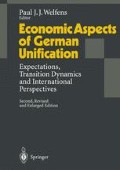Abstract
The German unification that took place economically on July 1, 1990 and politically a few months later on October 3 creates a new Germany in the center of Europe. Integrating the former GDR with its 16.4 million inhabitants into the Federal Republic of Germany means not only a 26.7 % increase in its population, but also the movement of the EC border by some 200 miles eastwards — the (former) CMEA thereby losing a member country and the Federal Republic of Germany becoming the immediate neighbor of Poland. Germany faces the challenge of organizing the systemic transition to a market economy in the territory of the former GDR with its labor force of 8.5 million, about a quarter of them working in one of 8000 state enterprises grouped under the last Communist government in a state holding company, the “Treuhandanstalt”.
Access this chapter
Tax calculation will be finalised at checkout
Purchases are for personal use only
Preview
Unable to display preview. Download preview PDF.
References
BALCEROWICZ, LESZEK and WELFENS, PAUL J.J., eds. (1988), Innovationsdynamik im Systemvergleich, Heidelberg: Physica.
BALASSA, BELA (1978), Exports and Economic Growth: Further Evidence, Journal of Development Economics, 181–189.
BUCHHEIM, CHRISTOPH (1990), Die Währungsreform in Westdeutschland im Jahre 1948. Einige ökonomische Aspekte, in: Fischer, Wolfram, ed., Währungsreform und soziale Marktwirtschaft, Berlin: Duncker, 393–402.
CASSEL, DIETER, ed. (1990), Wirtschaftssysteme im Umbruch, München: Vahlen.
CECCHINI, PAOLO (1988), The European Challenge 1992, Aldershot: Gower.
COUNCIL OF ECONOMIC EXPERTS (Sachverständigenrat zur Begutachtung der gesamtwirtschaftlichen Entwicklung, 1990b) Jahresgutachten 1990,91, Bonn.
COUNCIL OF ECONOMIC EXPERTS (Sachverständigenrat zur Begutachtung der gesamtwirtschaftlichen Entwicklung, 1990a), Zur Unterstützung der Wirtschaftsreform in der DDR: Voraussetzungen und Möglichkeiten, Sondergutachten vom 20. Januar 1990, Wiesbaden.
DEUTSCHE BUNDESBANK (1990), The Monetary Union with the German Democratic Republic, Monthly Report of the Deutsche Bundesbank, July 1990, 13–28.
DRABEK, ZDENEK (1985), Foreign Trade Performance and Policy, in: Kaser, M.C. and E.A. Radice, eds., Economic Structure and Performance between the Two Wars, Vol. 1 of the Economic History of Eastern Europe 1919–75, Oxford: Oxford University Press.
EC COMMISSION (1990), The Community and German Unification, Vol. 1 (COM (90) 400, Brussels, August 21, 1990.
IMF (1990), World Economic Outlook, October 1990, Washington D.C.
INOTAI, ANDRAS (1990), Foreign Direct Investments in Reforming CMEA Countries: Facts, Lessons and Perspectives, forthcoming in Klein, Michael and Welfens, Paul J.J., eds., Multinationals in the New Europe and Global Trade, New York: Springer.
INSTITUT FÜR ANGEWANDTE WIRTSCHAFTSFORSCHUNG BERLIN (1990), Ursachen der Wirtschaftskrise in der DDR, Berlin.
KLUMPP, RAINER (1990), Die Waehrungsreform von 1948. Ihre Bedeutung aus wachstumstheoretischer und ordnungspolitischer Sicht, in: Fischer, Wolfram, ed., Währungsreform and Soziale Marktwirtschaft, Berlin: Duncker, 403–422.
KOSTRZEWA, WOIJCIECH and SCHMIEDING, HOLGER (1989), The EFTA Option for Eastern Europe: Towards an Economic Reunification of the Divided Continent, Institut für Weltwirtschaft, Kiel Working Papers, 297, October 1989.
LIPTON, DAVID and SACHS, JEFFREY (1990), Creating a Market Economy in Eastern Europe: The Case of Poland, Brookings Papers on Economic Activity, Vol. 1990, 75–124.
MENDERSON HORST (1949), Prices, Money and the Distribution of Goods in Postwar Germany, American Economic Review, Vol. 39 (1949), 652–660.
MURRELL, PETER (1990), The Nature of Socialist Economies, Princeton: Princeton University Press.
POZNANSKI, KAZIMIERZ (1987), Technology, Competition and the Soviet Bloc in the World Market, Berkeley: Institute of International Studies.
RIEDEL, J. (1990), The State of Debate on Trade and Industrialization in Developing Countries, in Pearson, Charles and Riedel, James, eds., The Direction of Trade Policy, London: Basil Blackwell, 130–149.
SCHRENK, MARTIN (1990), The CMEA System of Trade and Payments: Today and Tomorrow, SPR Discussion Paper No. 5, January 1990.
SIEBERT, HORST (1990), The Economic Integration of Germany, Kiel Discussion Paper, Institut für Weltwirtschaft, Kiel.
UN COMMISSION FOR EUROPE (1990a), Economic Survey of Europe in 1989–90, New York.
UN COMMISSION FOR EUROPE (1990b), Economic Reforms in the European Centrally Planned Economies, New York.
VAN BERGEIJK, PETER A.G. and OLDERSMA, HARRY (1990), Détente, Market-oriented Reform and German Unification: Potential Consequences for the World Trade System, Kyklos, Vol. 43, 599–610.
WELFENS, MARIA J. (1990), Internationalisierung der UdSSR? Bedeutung der sowjetischen Reformpolitik für die Stellung des RGW und im Ost-West-Handel, in: Dieter Cassel, ed., Wirtschaftssysteme im Umbruch, München: Vahlen, 196–222.
WELFENS, PAUL J.J. (1988), The Economics of Military and Peacekeeping: An Emerging Field, Jahrbuch für Sozialwissenschaft, Vol. 40, 358–385.
Welfens, Paul J.J. (1990a), Internationalisierung von Wirtschaft und Wirtschaftspolitik, Internationalization of the Economy and Economic Policies, Heidelberg: Springer.
WELFENS, PAUL J.J. (1990b), Economic Reforms in Eastern Europe: Problems, Options and Opportunities, paper prepared for testimony before U.S. Senate, Small Business Committee, March 23, 1990, updated version published in: Intereconomics, 1991.
WELFENS, PAUL J.J. (1990c), Privatizations, M & As and Intra-Firm Cooperation in the EC: Improved Prospects for Innovation?, in: Perlman, Mark, ed., Entrepreneurship, Technological Innovation, and Economic Growth: Papers in the Schumpeterian Tradition, University of Michigan Press, forthcoming.
WELFENS, PAUL J.J., ed. (1991a), European Monetary Integration. From German Dominance to an EC Central Bank?, New York-Heidelberg: Springer.
WELFENS, PAUL J.J. (1991b), International Implications of German Monetary Unification, in: Dettke, D., ed., The European Monetary System and International Financial Markets, Bonn/Washington, 58–62.
WELFENS, PAUL J.J. (1992), The Market-Oriented Systemic Transformation of Socialist Economies, forthcoming.
WINIECKI, JAN (1990), Why Economic Reforms Fail in the Soviet System — A Property Rights-Based Approach, Econ0omic Inquiry, Vol. 28, 195–221.
Editor information
Editors and Affiliations
Rights and permissions
Copyright information
© 1996 Springer-Verlag Berlin Heidelberg
About this chapter
Cite this chapter
Welfens, P.J.J. (1996). EC Integration and Economic Reforms in CMEA Countries: A United Germany as a Bridge between East and West?. In: Welfens, P.J.J. (eds) Economic Aspects of German Unification. Springer, Berlin, Heidelberg. https://doi.org/10.1007/978-3-642-79972-3_26
Download citation
DOI: https://doi.org/10.1007/978-3-642-79972-3_26
Publisher Name: Springer, Berlin, Heidelberg
Print ISBN: 978-3-642-79974-7
Online ISBN: 978-3-642-79972-3
eBook Packages: Springer Book Archive

